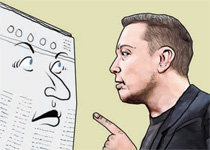Elon Musk’s ‘Pravda’
Elon Musk’s ‘Pravda’
Posted May. 26, 2018 07:38,
Updated May. 26, 2018 07:38

The Russian word “Pravda” means truth. “Pravda” has lost much of its influence now, but the paper “Pravda,” which was inaugurated in 1912, enjoyed immense influence as the Communist Party’s official newspaper during the Soviet era. The newspaper, which reported “South Korea invaded North Korea” when the Korean War broke in 1950, was full of lies rather than truths, and of propagandas rather than news. For this reason, critics would say “Pravda has no Pravda.”
Specter of “Pravda” is reemerging in the unlikely country of the United States in the 21st century. Moreover, it is poised to be revived by none other than billionaire entrepreneur Elon Musk, who is known as the model behind the blockbuster movie “Iron Man.” Recently, he said through 10 of his consecutive Twitter posts that he would create a website evaluating the credibility of reporters and media outlets, noting that the site will be named “Pravda.” He reportedly established an incorporated entity called “Pravda” last year, and attention is focusing on whether he actually means it or is simply joking.
Musk, an innovative entrepreneur and CEO of electric vehicle company Tesla who is widely known among the public, feels unease and is in the bad mood these days. Tesla stock has continued to nosedive. After posting the biggest fourth-quarter loss last year, the company recorded the worst first-quarter earnings ever this year. Musk even helped accelerate Tesla’s stock tumbling. Asked about the company’s production goals and financial situation at its earnings release early this month, he rebuked by saying it was a “boring and stupid question.” In the wake of the CEO’s arrogant and reckless answer, Tesla stock plummeted 6 percent. Meanwhile, when negative news reports were filed including those on delays in the automaker’s new vehicle production, and Musk’s alleged bid to block the establishment of a labor union, Musk apparently revealed his sense of crisis and anger against the media.
Has he learned this practice from President Donald Trump he originally supported? In his Twitter post, Musk said that self-righteous, hypocritical media outlets actually carry sugar-coated lies, while claiming they are truths. He sought to fuel his distrust of media, saying that energy companies are the biggest advertisers of the media, but Tesla does not advertise. Media is not perfect, but is critical to monitoring and controlling abusive behaviors of those in power and the rich. If the media turns a blind eye to wrongs just because the targets are the president or a Silicon Valley tycoon, it constitutes “cronyism.” The raison d’être of the media is “uncomfortable relationships” with those in power in the first place.
mskoh119@donga.com







